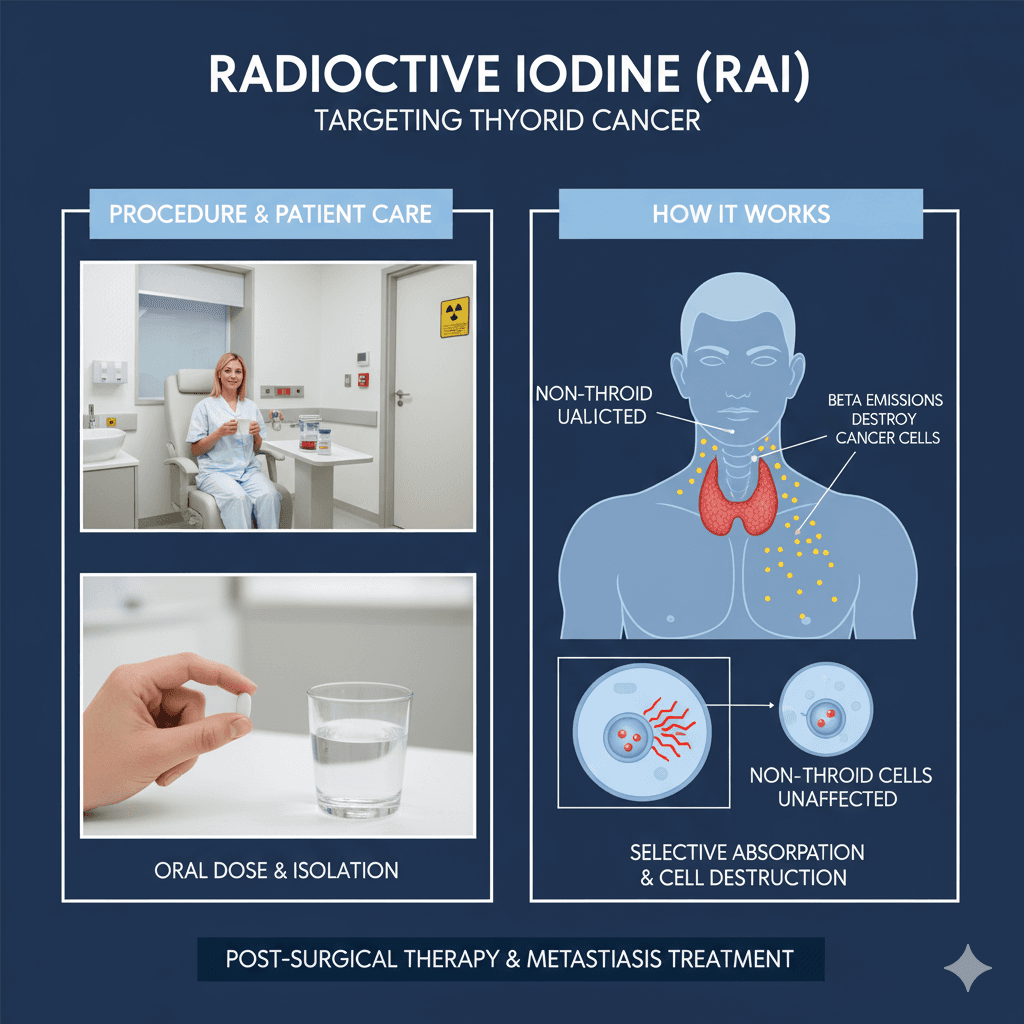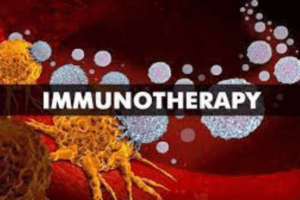
Radioactive Iodine

Radioactive Iodine Treatment: What you need to know
Q1: What is Radioactive Iodine Treatment?
A: Radioactive iodine treatment, also known as radioiodine therapy, is a type of treatment that uses a radioactive form of iodine (I-131) to treat certain thyroid conditions, including thyroid cancer and hyperthyroidism (an overactive thyroid). The radioactive iodine is absorbed by thyroid cells, where it destroys them, helping to manage or eliminate the disease.
Q2: How does Radioactive Iodine Treatment work?
A: The thyroid gland naturally absorbs iodine from the bloodstream to produce thyroid hormones. When radioactive iodine (I-131) is administered, it’s taken up by the thyroid cells just like regular iodine. The radioactivity then works to destroy the overactive thyroid cells or any remaining thyroid cancer cells, while sparing most other tissues in the body.
Q3: What conditions are treated with Radioactive Iodine?
A: Radioactive iodine treatment is commonly used to treat:
Hyperthyroidism: Caused by conditions like Graves’ disease or toxic nodular goiter, where the thyroid produces too much hormone.
Thyroid cancer: After surgery to remove the thyroid, radioiodine can be used to destroy any remaining thyroid tissue or cancer cells.
Q4: What should I expect during Radioactive Iodine Treatment?
A: The treatment is usually given as a single dose in the form of a pill or liquid. After taking the radioactive iodine, you’ll need to follow specific safety guidelines to avoid exposing others to radiation. This may include staying in isolation for a few days, avoiding close contact with others, and using separate bathroom facilities if possible. The radioactive iodine will gradually leave your body through urine over the next few days.
Q5: What are the benefits of Radioactive Iodine Treatment?
A: The primary benefits of radioactive iodine treatment are its effectiveness and targeted action. It specifically targets thyroid cells, making it a highly effective treatment for conditions like hyperthyroidism and thyroid cancer. For many patients, this treatment can eliminate the need for surgery or more invasive procedures.
Q6: Are there any side effects?
A: Common side effects include a sore throat, dry mouth, changes in taste, and nausea. Long-term side effects may include hypothyroidism (an underactive thyroid), which can be managed with thyroid hormone replacement therapy. Rarely, there may be an increased risk of other cancers, but this risk is generally low. Your doctor will discuss potential risks with you before treatment.
Q7: How do I prepare for Radioactive Iodine Treatment?
A: Preparation may involve following a low-iodine diet for a week or two before treatment to increase the effectiveness of the therapy. Your doctor may also advise you to stop taking certain thyroid medications temporarily. It’s important to follow all instructions provided by your healthcare team to ensure the best possible outcome.
Q8: Is Radioactive Iodine Treatment safe?
A: Yes, when used under the guidance of a healthcare professional, radioactive iodine treatment is considered safe and effective. The radiation used in this treatment is generally low and targeted, minimizing exposure to the rest of the body. However, it’s important to follow safety guidelines to protect yourself and others during the treatment period.
If you have more questions or concerns about radioactive iodine treatment, be sure to talk to your healthcare provider. They can provide detailed information and guidance tailored to your specific needs.
Trustindex verifies that the original source of the review is Google. Dr. Ruchir bhandari is best radiation oncologist & incredibly knowledgeable.Highly recommend! Thank you so much for your Providing knowledgeable care and taking out time to address all your questions when ever asked. With your best of knowledge got the best treatment and the result is today I am free from Cancer diseases. You continues efforts, guidance and timely treatment made this happen. You patience listening to the patient boost the will power and morale of the patient and that has helped me to recover fast in my endeavour to get back to my normal life. Long live doctor. Thank you so much,God bless you.Posted onTrustindex verifies that the original source of the review is Google. Best cancer specialist in jaipur. With most advanced technology ( cyber knife)Posted onTrustindex verifies that the original source of the review is Google. Very good doctor, with great knowledge, mere known ka cyber knife se treatment krvaya or ab vo bilkul theek h, thank you Dr ruchir Bhandari sir and thank you Dr pankaj sharma ji for support nd conclingPosted onTrustindex verifies that the original source of the review is Google. Dr. Ruchir bhandari is best radiation oncologist & incredibly knowledgeable and took the time to answer all my questions. Highly recommend! Thank you so much for your kind words! Providing knowledgeable care and taking the time to address all your questions are integral parts of our commitment to patient satisfaction.Posted onTrustindex verifies that the original source of the review is Google. Rajasthan 1st cyber knife . Best radiotherapy treatment SRT , SBRT , SRS , FSRSPosted onTrustindex verifies that the original source of the review is Google. डॉ. रुचिर भंडारी और उनकी टीम को अविश्वसनीय रूप से जानकारी हैं। उनकी विशेषज्ञता और असाधारण देखभाल ने मेरी बहन सीमा माली के ब्रेन ट्यूमर के इलाज में सचमुच बहुत बड़ा बदलाव लाया है। और वे लक्षणों को ध्यान से सुनते हैं और फिर सही इलाज शुरू करते हैं। भगवान आप और आपकी टीम को दीर्घायु एवं अच्छा स्वास्थ्य प्रदान करे।Posted onTrustindex verifies that the original source of the review is Google. Best Radiation oncologist in Jaipur. I like his approach, expertise on cyberknife, his follow up and concern for patient health. Thanks to Dr. Ruchir and his complete team.Posted onTrustindex verifies that the original source of the review is Google. I take treatment on cyberknife for my relative at mhatama gandhi hospital. I thanks to Dr ruchir bhandari and team cyberknife for best treatment. I suggest that this advance machine is best for radio robotic surgery
Related Post
Click below to book a clinic appointment
Ask More Questions Send Query On Email



